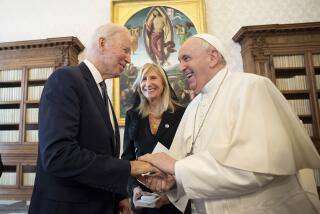U.S. Bishops Call on Bush to Avoid War
- Share via
WASHINGTON — The nation’s Roman Catholic bishops Monday overwhelmingly endorsed a statement urging the Bush Administration to avoid war in the Persian Gulf, except as a last resort, and to use restraint to prevent civilian casualties if diplomatic efforts fail.
In approving the statement drafted by Los Angeles Archbishop Roger M. Mahony by a vote of 249 to 15, the National Conference of Catholic Bishops became one of the first major U.S. groups to challenge the Bush Administration’s policy in the Persian Gulf.
Mahony stressed the “just war” doctrine--enunciated in pastoral letters by the bishops in 1983 and 1986--which says that the use of force must be “a final and last resort.” He added at a news conference, “It would be our judgment that today we are not at that moment.”
The group also agreed to make the gulf crisis a special focus of its annual fall meeting, which opened Monday. However, a move to debate the issue in a public session was narrowly headed off by more conservative bishops, who opted instead for a closed discussion Wednesday.
The statement urging the Administration to “stay the course of persistent, peaceful and determined pressure against Iraq” was sent by Mahony last week as an open letter to Secretary of State James A. Baker III.
It noted the “just war” doctrine and said that if war becomes inevitable, “the military means used must be commensurate with the evil to be overcome and must be directed at the aggressors, not innocent people.” This means that any war would have to be limited, the statement said, and it rules out tactics that “could clearly target civilian lives.”
Any military action should also be sanctioned by international assent and by Congress, the statement added.
Presenting the letter for formal approval Monday, Mahony said it was written expressly with a view to influencing Administration policy. It was dispatched to Baker before Bush’s announcement last week of a buildup of forces in the gulf--action that Mahony called “a significant new ingredient” for debate.
Mahony’s stated judgment that the gulf crisis does not yet justify military force was echoed by Thomas J. Gumbleton, auxiliary bishop of Detroit. “It is very clear that the conditions of a ‘just war’ are not fulfilled in this instance,” he said during debate.
Gumbleton last week had said he would ask the bishops to sign a statement asking Catholic soldiers to become “selective conscientious objectors” and actively resist offensive deployment.
Mahony several times noted with approval Iraqi President Saddam Hussein’s offer for a “deep dialogue.” But despite Hussein’s call for dialogue Sunday, on Monday the Iraqi leader seemed to reject an emergency summit proposed by Morocco’s King Hassan, saying that talks might be used as a cover for an “American-Zionist” attack on Iraq.
The bishops’ agreement to push for further debate--a move that could result in an even stronger statement against U.S. policy in the gulf--seemed to be spearheaded by several of the same bishops who have been most strongly opposed to accepting any ethical basis for maintaining a nuclear deterrent.
Leading the move were Gumbleton, Bishops Francis T. Hurley of Anchorage, Alaska, John F. Kinney of Bismarck, N.D., and Michael H. Kenney of Juneau, Alaska. Kenney, in debate, declared himself “appalled” that the Persian Gulf crisis was virtually ignored by most candidates in last week’s elections.
Cardinal Bernard Law of Boston, a more conservative voice, led a countermove to keep the discussion off the public agenda of the conference and place it instead in Wednesday’s closed-door executive session. The proposal barely passed by a 126-118 vote.
Mahony, speaking to reporters, made it plain that he voted against Cardinal Law’s move to close the discussion. He added: “I am going to encourage a public statement of some kind which will (help stimulate) public debate before we leave here.”
More to Read
Get the L.A. Times Politics newsletter
Deeply reported insights into legislation, politics and policy from Sacramento, Washington and beyond. In your inbox twice per week.
You may occasionally receive promotional content from the Los Angeles Times.










